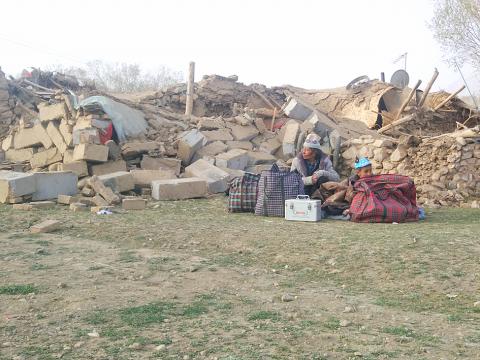An earthquake yesterday rocked China’s western Xinjiang region, killing eight people and injuring 23 as more than 1,500 homes crumbled, state media reported.
The shallow magnitude 5.4 quake struck at 5:58am, 213km south-southwest of the city of Kashgar, the US Geological Survey said.
The city is notable for being a stop on the Karakoram Highway, built along the ancient Silk Road connecting China’s far-western city of Kashgar to the Pakistani capital of Islamabad.

Photo: Reuters
Xinhua news agency said there had been frequent aftershocks.
The Xinjiang Earthquake Administration said 23 people had been injured, including one seriously, and more than 180 houses had collapsed in the lightly populated area.
Most houses in the area were made of wood and mudbricks or rock, it said.
Some people were buried after their adobe homes collapsed, said Wang Fuyou (王福友), Chinese Communist Party chief of Taxkorgan County, according to Xinhua.
Rescuers were searching for people trapped in the rubble in Quzgun, the worst-hit village, which has a population of 449, Wang said.
More than 1,500 homes collapsed in Quzgun, Xinhua said.
More than 9,000 people were relocated in the region, while 1,000 soldiers and 1,500 civilians were participating in rescue efforts, it said.
Xinhua said the injured people were taken to hospitals.
The People’s Daily posted a photograph on Twitter of a building in complete ruins.
Other photos, all from the earthquake administration, showed ceiling panels on the ground in one building and products on the floor in a store.

US PUBLICATION: The results indicated a change in attitude after a 2023 survey showed 55 percent supported full-scale war to achieve unification, the report said More than half of Chinese were against the use of force to unify with Taiwan under any circumstances, a survey conducted by the Atlanta, Georgia-based Carter Center and Emory University found. The survey results, which were released on Wednesday in a report titled “Sovereignty, Security, & US-China Relations: Chinese Public Opinion,” showed that 55.1 percent of respondents agreed or somewhat agreed that “the Taiwan problem should not be resolved using force under any circumstances,” while 24.5 percent “strongly” or “somewhat” disagreed with the statement. The results indicated a change in attitude after a survey published in “Assessing Public Support for (Non)Peaceful Unification

The CIA has a message for Chinese government officials worried about their place in Chinese President Xi Jinping’s (習近平) government: Come work with us. The agency released two Mandarin-language videos on social media on Thursday inviting disgruntled officials to contact the CIA. The recruitment videos posted on YouTube and X racked up more than 5 million views combined in their first day. The outreach comes as CIA Director John Ratcliffe has vowed to boost the agency’s use of intelligence from human sources and its focus on China, which has recently targeted US officials with its own espionage operations. The videos are “aimed at

‘MISGUIDED EDICT’: Two US representatives warned that Somalia’s passport move could result in severe retaliatory consequences and urged it to reverse its decision Minister of Foreign Affairs Lin Chia-lung (林佳龍) has ordered that a special project be launched to counter China’s “legal warfare” distorting UN Resolution 2758, a foreign affairs official said yesterday. Somalia’s Civil Aviation Authority on Wednesday cited UN Resolution 2758 and Mogadishu’s compliance with the “one China” principle as it banned people from entering or transiting in the African nation using Taiwanese passports or other Taiwanese travel documents. The International Air Transport Association’s system shows that Taiwanese passport holders cannot enter Somalia or transit there. The Ministry of Foreign Affairs (MOFA) protested the move and warned Taiwanese against traveling to Somalia or Somaliland

SECURITY: Grassroots civil servants would only need to disclose their travel, while those who have access to classified information would be subject to stricter regulations The government is considering requiring legislators and elected officials to obtain prior approval before traveling to China to prevent Chinese infiltration, an official familiar with national security said yesterday. President William Lai (賴清德) in March announced 17 measures to counter China’s growing infiltration efforts, including requiring all civil servants to make trips to China more transparent so they can be held publicly accountable. The official said that the government is considering amending the Act Governing Relations Between the People of the Taiwan Area and Mainland Area (臺灣地區與大陸地區人民關係條例) to require all civil servants to follow strict regulations before traveling to China.